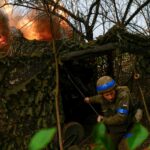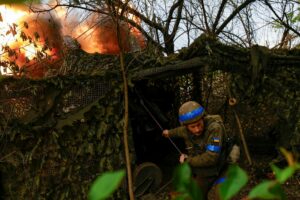Seven months after the start of Sudan’s civil war, conditions for many in the capital, Khartoum, are worse than ever – but some of those who escaped from the city in the early days are also struggling to survive.
Abdul-Aziz Hussein – whose name has been changed for his safety – took the decision in April to stay in Khartoum. He never thought the fighting between the army and paramilitary Rapid Support Forces (RSF) would last so long.
“We are still besieged, and the fighting has not stopped,” he tells me when I get through by telephone.
“The RSF have penetrated the area and caused havoc, while the army is shelling their positions within the neighbourhood. Death could come at any moment.”
An estimated 5,000 Sudanese people have already been killed in crossfire between these two warring branches of the military, while many more have been injured.
With his wife and three children, the 45-year-old teacher is now desperate to leave. Last month they almost did, but the fighting around their home in the suburb of Kalakla was too intense.
The area is now a ghost town, the family has not eaten for two days and even water is hard to find. Electricity, Mr Hussein says, is a rare luxury.
The second time I call, Mr Hussein tells me that marauding RSF soldiers are looting shops and people’s homes.
It’s like living in “a piece of hell”, he says.
The intense fighting in Khartoum and the western region of Darfur is causing serious problems with the distribution of aid, the UN says.
It says more than five million people have been displaced by the conflict and 24.7 million are in need of urgent humanitarian assistance.
Many have no access to clean water, increasing the risk of cholera and other diseases.
“We need a ceasefire that allows us to deliver humanitarian aid to those affected and assess the extent of their needs,” says the UN’s deputy special representative in Sudan, Clementine Nkweta-Salami.
“Most importantly, we need a permanent cessation of hostilities. We want this fighting to stop so aid can be delivered, and Sudanese people can resume their normal lives.”
A few short humanitarian truces were agreed in the early months of the war, but various ongoing peace initiatives are making little tangible progress. Unicef’s representative in Sudan, Mandeep O’Brien, told the BBC a humanitarian crisis was looming.
“The war needs to stop now, for the sake of children and for the sake of the future of Sudan,” she says. “If the war continues, by the end of this year, we believe the situation will be catastrophic.”
Even those who escaped from Khartoum to the relative safety of Port Sudan, on the Red Sea coast, are often struggling to survive.
In a shelter for displaced people in the port city, I met Hawa Suleiman trying in vain to make a meal for her five children from the meagre remains of a tin of wheat.
They receive one meal per day, provided by a Qatari charity, which Ms Suleiman divides in half so that her children have something for breakfast. With no refrigeration, however, the food sometimes goes off and makes her children sick.
She and her children fled Omdurman, the city across the River Nile from Khartoum, soon after the fighting started on 14 April. Bombs were falling as they escaped and she and her husband became separated in the chaos. There has been no word from him since, and no news whether he is alive or dead.
Arriving in Port Sudan after a journey of 1,000km (620 miles), the family applied to be evacuated, but were told the boats were for foreigners only. Syrian businessmen paid for food to be delivered to Syrian refugees in the camp where they were staying, while Sudanese people went hungry.
Ms Suleiman soon discovered she was on her own. When one of her children fell ill with food poisoning, she was only able to buy antibiotics thanks to a well-wisher, who footed half the bill.
“The doctor herself cried over our condition,” Ms Suleiman says. “We are exhausted. Our suffering has gone beyond all limits.”
As well as the Sudanese, people from many other nationalities are suffering because of this war – among them Syrians, Pakistanis and Indians, and large numbers of refugees from South Sudan. In Port Sudan, hundreds of families are now living in an overcrowded shelter that was formerly a university dormitory.
Abiol is one of them. She had earlier fled from South Sudan and settled in a camp for displaced people in Khartoum’s north-eastern district of al-Haj Yousif.
“I had hoped to return to my country, but the war started in Khartoum, and we were forced to migrate once again to Port Sudan,” she says.
“It’s as though fate has written for us to live our entire lives in refugee camps.”
Peter, a refugee from the Democratic Republic Congo, was studying at the International University of Africa in Khartoum before the fighting began. He says conditions in the Port Sudan dormitory are dire, so he sells charcoal in order to “live a slightly better life”.
Aid workers have also been among the victims of the conflict, with 900 security incidents involving UN workers, and 19 deaths. This makes it the most dangerous place in the world for humanitarian workers.
Meanwhile the UN is struggling to fund its work in the country, having only raised funds to cover a quarter of its $2.6bn (£2bn) humanitarian response plan.
“The cost of inaction is high,” says Ms Nkweta-Salami. “That’s why we urgently appeal to our donors to please support our efforts, and [appeal] to the parties to stop the violence and conflict.”
Source : BBC















